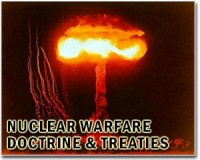| . |  |
. |
Moscow (AFP) Dec 3, 2009 A landmark US-Russian treaty seen as a linchpin of nuclear arms control is all but certain to expire Saturday, despite US President Barack Obama's efforts to improve ties with Moscow. When the Obama administration announced plans to "reset" the badly strained US relationship with Russia, it made finding a new nuclear disarmament treaty the centrepiece of that objective. But despite marathon negotiations in recent weeks, a successor to the 1991 Strategic Arms Reduction Treaty (START) before its December 5 expiration date seems out of reach, and some are asking: what reset? Signalling the deadline would be missed, US State Department spokesman Ian Kelly told reporters in Washington this week that negotiators were aiming to have a draft agreement "by the end of December." Optimism on reaching a START deal had abounded in September after the Obama administration removed a major obstacle in the talks: a planned US missile shield in eastern Europe that had fiercely opposed by Russia. But such buoyancy has been absent in recent weeks, amid reports that negotiators in Geneva have been unable to reach agreement on US monitoring of Russia's nuclear missile arsenal. The "verification" measures laid out in START were a key element in building trust between the former Cold War foes and reducing the risk of nuclear Armageddon. "Talks should have been about extending some provision of the old treaty such as the verification mechanisms. But our military didn't want that," Moscow-based defence analyst Alexander Konovalov told AFP. "There are serious forces on our side and theirs that do not want a new agreement. It's not yet clear who will win." One thorn in Moscow's side under the current treaty are round-the-clock US inspections at Russia's foremost missile plant in Votkinsk, about 580 kilometres (360 miles) northeast of Moscow. "Even the Americans agree that there shouldn't be as burdensome a mechanism of control as in START-1," said Vladimir Dvorkin, a retired Russian general who is now an expert at the Centre for International Security in Moscow. "But the Americans play tennis there, they like it at Votkinsk," Dvorkin said. Washington is pushing for interim deal to extend verification measures in the period between Saturday and whenever a new treaty enters into force, US State Department spokesman Kelly said this week. The hang-up over verification measures comes despite the fact that the broad outlines of a successor treaty were agreed in July at a summit between Obama and Russian President Dmitry Medvedev in Moscow. At the summit, Obama and Medvedev agreed to reduce the number of warheads on either side to between 1,500 and 1,675 and the number of "carriers" capable of delivering them to between 500 and 1,100. The New York Times, citing an unnamed US official, reported this week that the two sides had managed to narrow the gap on carriers to a number below 800. The term "carriers" typically refers to intercontinental ballistic missiles, submarine-based missiles and strategic bombers. The cuts outlined by Obama and Medvedev are not very deep, though they would reduce warheads to below the level agreed in the last arms control treaty, the SORT agreement of 2002, which cut warheads to between 1,700 and 2,200 on either side. Analysts warned that talks on finding a successor to START could drag on for months, developing into a new sore in US-Russia ties. "If no agreement is signed, it would make the situation worse not in nuclear terms but in political terms," independent Moscow-based military analyst Pavel Felgenhauer told AFP. "The agreement that was seen as a symbol of the 'reset' is increasingly becoming a problem in of itself," he said. "If December 5 passes without any progress, it could be a serious political setback for Obama and most likely for Medvedev too." Share This Article With Planet Earth
Related Links Learn about nuclear weapons doctrine and defense at SpaceWar.com Learn about missile defense at SpaceWar.com All about missiles at SpaceWar.com Learn about the Superpowers of the 21st Century at SpaceWar.com
 Game theorists hope to solve world's crises
Game theorists hope to solve world's crisesWashington (AFP) Nov 30, 2009 North Korea will mothball its nuclear weapons for a billion dollars a year, Iran will not build nukes at all and Middle East peace is just round the corner, at least according to one game theorist courted by the CIA. For someone who admits he is not an expert in the topics he studies and to "piggybacking" on predecessors' work, Bruce Bueno de Mesquita has become surprisingly influential. ... read more |
|
| The content herein, unless otherwise known to be public domain, are Copyright 1995-2009 - SpaceDaily. AFP and UPI Wire Stories are copyright Agence France-Presse and United Press International. ESA Portal Reports are copyright European Space Agency. All NASA sourced material is public domain. Additional copyrights may apply in whole or part to other bona fide parties. Advertising does not imply endorsement,agreement or approval of any opinions, statements or information provided by SpaceDaily on any Web page published or hosted by SpaceDaily. Privacy Statement |